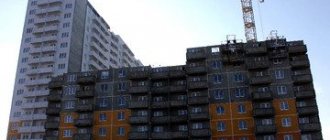Shared construction involves investing money from a person (shareholder) for the construction of a real estate property.
Dear readers! Our articles talk about typical ways to resolve legal issues, but each case is unique. If you want to find out how to solve your particular problem, please use the online consultant form on the right or call. It's fast and free!
The cost of square meters in this case is much lower, but it is also the riskiest method of investing money. The developer company may face a financial crisis, which may lead to financial losses.
What is shared housing construction?
This is the construction of a house under an agreement concluded between shareholders and the developer. The first (individuals and legal entities) give money to the second (contractor company), who, with these funds, undertakes to create an agreed upon facility within the agreed time frame and put it into operation.
In essence, the one who wants to get an apartment becomes an investor and contributes his funds - under the protection of a contract regulating the rights and obligations of the parties, and Federal Law 214 of December 30, 2004.
This option became possible due to the fact that the real estate market is divided into two sectors:
- secondary - the owner already owned the living space (or belongs to him right now, and he is selling it);
- primary – new square meters, the original owner of which will be the investor.
Where will the house appear? On the land of a developer who has a plot, but no money to carry out the work. So he attracts legal entities and individuals who agree to become investors (because the bank will not give him the required amount, it is too large).
Why do people and firms even respond to such proposals? Because the price is 1 sq. m. at the same time minimal - the terms of cooperation seem mutually beneficial.
Why then do we need a regulatory law? To protect against scammers, to prevent situations in which an unscrupulous landowner will collect money and simply disappear.
From here it becomes clear what shared housing is: this is the apartment or other area that the investor receives in proportion to his participation. The latter, by the way, can be carried out according to several schemes. For example, both with stage-by-stage payment and with 100% prepayment. Naturally, it is more difficult to provide the entire amount of funds at once, but in this case the investor does not depend on inflation or other economic problems, whereas in the first situation the cost per square meter inevitably increases over time. Another option is an investment to offset existing property, for example, a car, which partially compensates for the amount (and the rest can be paid off in some other way).
Advantages and disadvantages
Although there is controversy surrounding this form of construction, although many consider it controversial, it is worth recognizing that for most people who do not want to get into a mortgage, this is almost the only method by which they can quite easily acquire housing. But it is important to objectively understand both the advantages and disadvantages that shared ownership has.
Pros:
- It is possible to spread out payments for the purchase of an apartment until the completion of construction, which greatly reduces the burden on equity holders.
- The cost of purchasing real estate is quite low. If you purchase the same object after its immediate commissioning, the cost will increase significantly - so the savings in shared construction are obvious.
- The shareholder acquires a new apartment, and not an apartment that was previously used by someone else, with all the ensuing consequences.
Minuses:
- The possibility of falling for the above “gray” schemes.
- There is a chance that the quality of construction will be insufficient as a result. Legally, this aspect will be regulated by the contract, but the shareholder will lose time.
Mortgage loan secured by housing under construction
Currently, banks agree to accept non-existent real estate as collateral only if the following conditions are met:
— the credit institution carefully analyzes each developer with whom it will cooperate,
- the bank risks issuing money for an “empty place” before the house is put into operation and the apartment is officially registered. The interest rate on a mortgage loan before and after completion of construction usually differs significantly.
— a mandatory condition is the registration of the shared construction agreement in Rosreestr,
— as collateral, the bank accepts the right of claim against the developer before the property is completed. If a citizen does not comply with the terms of the mortgage agreement, he may lose the right to an apartment even before it is built.
Key features of participation in shared construction
Let's consider the main points - those pitfalls that any individual or legal entity who wants to spend their money rationally and seeks to protect themselves from risks should remember:
- the law protects the investor only if he has entered into an agreement, and not a preliminary one, but one officially registered with Rosreestr, that is, it has become legal. Even when using the bill system, there are essentially no guarantees of the final receipt of real estate;
- Cash settlements should be carried out strictly after the entry into force of the DDU. If the other party offers (or, moreover, demands) to pay her before this moment, then she is quite likely committed to some kind of deception; such actions should be alarming;
- shared participation in construction is a procedure in which the contractor cannot do whatever it wants, but is obliged to comply with its obligations. Therefore, it can and should be charged a penalty in cases where it seriously delays the delivery date or provides the facility in an unsuitable condition for use. In some cases, it is permissible to terminate it through the court or even unilaterally: if the construction of a building is frozen for 2 months or longer, if the area does not meet the requirements by 5% or more, and so on;
- the investor has the opportunity to sell his rights by signing an assignment agreement with any legal entity or individual. If the latter meets all the norms of the law, the developer cannot be against concluding such a transaction;
- the investor should also fulfill his obligations, that is, make regular payments on time. If he does not do this, the other party may charge him a penalty or even terminate the contract (in cases where there is a delay of 2 months or longer). Attention, the investor cannot leave the project at will - he must have good reasons for this, regulated by Article 9 of Federal Law No. 214.
Rights and obligations of the parties
The federal law describes the information that a construction company is obliged to provide to the shareholder before signing the contract: permission to use the land, to carry out construction work, a project, and other necessary documentation. A citizen who has decided to enter into shared construction has the right to study all the necessary information about the developer. The citizen who contributed the funds is allowed to terminate the contract unilaterally if certain situations occur:
- the developer violated the deadline for putting the house into operation,
- construction work was suspended,
- the area of housing has changed,
- the result does not correspond to promises.
The shareholder has the right to demand a penalty from the developer if the terms of the contract were violated (for example, the house was not delivered within the stated period). Upon termination of the contract, the deposited amount of money is returned, increased by the amount of interest for its use.
During the process of accepting and transferring housing, it is impossible to see some shortcomings. For these purposes, a warranty period is provided during which claims can be made against the developer. The requirement concerns: reduction in the cost of housing, elimination of defects free of charge, reimbursement of funds spent on corrections.
A citizen who has purchased an apartment through equity participation in construction must submit the contract for registration to Rosreestr.
How to become a participant in shared construction?
Anyone can take part in shared construction. Weigh the pros and cons and start searching for a reliable developer and a place where you would like to buy an apartment.
- Search for a developer, house and apartment. Real estate portals host many developers who offer shared construction in Minsk and other cities. Explore all the options and choose the best one for you.
- Developer check. Before concluding an agreement with a construction organization, check the information about the developer. Rely on indicators such as: company experience; the objects she built; reviews from investors and buyers. Knowing the full name of the construction organization, you can also check the legal information about it. This can be done on the portal of the Unified State Register of Belarus. The Unified State Register database stores complete information about each organization: presence of tax debts; land ownership; compliance of the project declaration and documentation with state standards.
- Conclusion of an agreement. If you are satisfied with the developer and his conditions, feel free to enter into a shared construction agreement.
- Making payment. After concluding the contract, the developer gives you a special account number in one of the banks. Every time you transfer funds there, the bank makes sure that the money goes in the right direction. Control is carried out at all stages of construction.
- Transfer of apartment. When the construction of a house is completed, the developer is obliged to measure the footage of each apartment and recalculate the cost. During the construction process, some parameters may have changed, and, accordingly, the price. If your living space has more square meters, you will need to make an additional payment. In case of violations, the developer eliminates them within 3 months at his own expense. Upon transfer, an act of acceptance and transfer of living space is concluded, which is signed by both parties. The buyer is given the keys, and he receives the legal right to own the property.
How to conclude an agreement on shared construction?
When concluding an agreement, the developer must comply with certain requirements established by law. If the conditions of shared construction have not been met, he does not have the right to attract money from shareholders.
A standard agreement is concluded between the developer and the shareholder. Before signing, make sure that the agreement specifies the entire list of conditions for shared construction:
- Indication of the specific houses and apartments that will be built and transferred to you, as well as their characteristics*
- Bank details and numbers of special accounts where funds will be transferred
- Terms of construction and commissioning of housing
- Total cost of the apartment and price per 1 sq. m.
- Amount and procedure for depositing funds
- Warranty period for the apartment
- Rights and obligations of the parties
- Procedure for amendments and additions to the agreement
- The developer’s obligation to transfer the property to you after completion of construction (it must meet all technical and sanitary requirements, as well as contract norms)
- The procedure for acceptance and delivery of an apartment
- Procedure for early termination of the agreement
- Procedure for refunding money in case of early termination or failure to fulfill obligations
- Responsibility of the parties for failure to fulfill obligations
*The agreement must include the following information and characteristics of the construction project:
- Purpose
- Address
- Common and living area
- Number of rooms and their footage
- Total area of utility rooms
- Floor and wall material
- Availability of doors, windows, ceilings, sanitary and other equipment
- Availability and condition of interior decoration
- Type of residential building
- House material (block, brick, etc.)
- Construction series
- Availability of a technical floor, basements, attics, elevators, parking, shops, etc.
- Availability of utility networks for electricity, gas, water supply, sewerage, communications, etc.
- Apartment improvement and landscaping objects
The agreement must be registered with the executive committee. This is done by the developer himself within 3 days from the date of signing the document. Within another 3 days, the executive committee reviews the agreement and registers it. Both copies of the agreement are stamped. Within 3 days after registration, the developer must send one copy of the registered agreement to you. In case of changes in the main terms of the contract and the conclusion of additional agreements, they are also subject to registration with the executive committee.
Main provisions of the agreement
The relationship between the developer and the project participant is regulated by the DDU, concluded in strict accordance with Federal Law 214.
There is no single form of document; each company develops its own agreement. However, there are mandatory provisions, in the absence of which the contract is considered not concluded. The document must contain:
- detailed description of the transferred object;
- the exact date of transfer of housing to the shareholder;
- the price of the contract, the method and timing of its payment;
- guarantees for the construction project;
- a method of securing obligations by the developer.
These are just the main provisions of the DDU. There are a number of other important points that must be reflected in the contract. You can find out in more detail what the document should look like in the article “How to correctly draw up a shared construction agreement.”
The developer is obliged to take care of ensuring its obligations to the participant. To do this, he must either obtain a bank guarantee or enter into an insurance agreement. The DDU includes information about the insured or guarantor, whom the shareholder can invoice if the construction company does not fulfill its obligations to it.
The DDU acquires legal force only after undergoing mandatory registration with Rosreestr. Citizens who decide to take part in the construction of housing need to know that they need to make any payments under the contract only after it has been registered. The actions of a developer who demands money before this deadline are illegal.
How to terminate a shared construction contract?
Both the developer and the shareholder can terminate the contract. Moreover, the developer has the right to do this in cases where:
- The buyer paid funds late or not in full for 2 consecutive months.
- The buyer does not agree with the justified price change (if the price was indexed).
Each shareholder has the right to terminate the agreement early and return the money paid at any time. To return the money, the buyer must provide the developer with the following documents:
- Copies of payment receipts
- Copies of granted loans
- Bank certificate about loan debt
- Certificate from the executive committee regarding subsidies for loan repayment
The refund amount is indexed, i.e. recalculated to the actual date of return. Refunds occur within 3 months from the date of termination of the contract.
Other features of participation in shared construction:
- Payments are made by bank transfer.
- In case of late payment, the shareholder is obliged to pay a penalty: 0.02% or 0.002% of the overdue payment amount for each day of delay.
- The apartment is transferred to the shareholder only after full payment of the apartment (even if other shareholders have debts).
- Within 3 months, the received apartment must be registered with the BTI, receive a passport and a certificate of registration of the apartment.
Whether to enter into shared construction or not is everyone’s business. Thanks to state protection of the rights of shareholders, the danger of losing money and housing has been reduced to a minimum. And the list of benefits has only grown. But no matter what guarantees Belarusian legislation provides, always check the reputation of the construction organization. This way you will protect yourself and your property.
When can a shareholder go to court?
Most often, participants in shared construction go to court regarding:
- disputes about violation of deadlines;
- non-compliance of the quality of construction with the stated standards;
- significant violations of the requirements of the DDU regarding the layout of constructed facilities.
Having studied several hundred court cases from 2019-2020. Regarding shared construction, some conclusions can be drawn:
1. If the shareholder has a DDU in his hands, drawn up in accordance with all the requirements of the law, and he goes to court regarding a violation of the terms of the agreement in any part of it (terms, cost, layout, etc.), then in most cases the court takes the side of the shareholder. The court considers the relationship between the developer and the shareholder through the prism of Federal Law-214 and the Law on the Protection of Consumer Rights.
2. When assigning rights under the DDU in the event of litigation, not only the current owner of the rights, but also the former shareholder is involved in the process.
3. If the terms of the DDU are violated by the shareholder himself, by untimely depositing money into the developer’s cash desk under the agreement, the court is guided in its decisions by Art. 450 Civil Code of the Russian Federation. At the same time, the developer’s claims are limited by the provisions of this article and the court insists on their reasonable limits and a fair approach to the issues of compensation for damage from the actions of the shareholder.
4. When considering court cases related to the collection of penalties from the developer, the court in most cases satisfies the plaintiff’s demands. In judicial practice, there are often cases when the defendant, for various reasons, tries to reduce the amount of the penalty. It is the responsibility of the construction company to prove that the amount requested by the plaintiff is excessive and does not correspond to the severity of the violation of the contract.
5. It is also the responsibility of the developer to prove in court that the housing constructed is of adequate quality. This follows from the provisions of the Civil Code and is dictated by the fact that the developer is a professional participant in the construction market, in contrast to the shareholder.
What obligations are imposed on the parties to the transaction?
By signing an agreement, the parties assume certain obligations.
The developer undertakes:
- accept funds from the shareholder and use them for the construction of a house and for other purposes permitted by law;
- carry out the necessary procedures for registration and registration of preschool educational institutions;
- build an object that meets the terms of the contract in terms of quality, and transfer it to the equity holder within a strictly allotted time frame;
- satisfy the claims of participants regarding the quality of the object within the warranty period established by law.
The main responsibility of the shareholder is to make payments for the apartment on time and without delay. Payment can be made either at a time or in installments in accordance with the schedule specified in the contract. The participant is also obliged to accept the apartment within the period established by law and the contract.
For failure to fulfill obligations, the parties are responsible to each other. For violation of construction deadlines and transfer of low-quality housing, the developer is obliged to pay the participant a penalty established by law. In case of significant violations on the part of the builders, the shareholder may, on his own initiative, terminate the contract. In turn, the developer also has the right to collect a penalty from the participant if the latter is more than two months late in payment.
What requirements does the law impose on developers?
Only those construction companies that operate within the framework of the law and fully comply with the requirements of the law can raise money. The developer must:
- have sufficient financial resources available (minimum 2.5 million);
- be a bona fide participant in public procurement and not be on any lists of unreliable suppliers;
- do not have tax debt of more than 25% of your assets;
- it should not be subject to liquidation or bankruptcy proceedings.
The developer must have a construction permit in hand, and a project declaration for the facility being built must also be published on its official website. Only after this the developer has the right to conclude deals and attract investments.
Even before signing the contract, the developer is obliged to insure its liability to each participant. He must have insurance or a surety agreement, and the developer may also be a member of a mutual insurance company.
For projects that began operating on January 1, 2021, a new way to ensure the responsibility of developers has been introduced - contributions to the compensation fund from each concluded DDU.
New additional requirements for the developer
We will separately describe the new requirements for the developer himself, introduced by law. In order to protect potential equity holders from deception by criminal developers, the law puts forward the following requirements for developers:
- liquidation procedures of a legal entity are not being carried out in relation to the developer, and there is no corresponding decision of the arbitration court;
- the developer’s activities have not been suspended by a decision of the arbitration court;
- the developer is not in the register of unscrupulous developers;
- the developer does not have debts on taxes and fees, the amount of which exceeds 25% of the value of the developer’s assets (clause 7 of part 2 of article 3 of the law). If any decision is made against the developer that suspends its activities (liquidation or bankruptcy), then the court must, within one working day, send such a decision to the regulatory authority, which, in turn, enters this information into the Register and this legal entity does not have the right to raise funds for shared construction. This ensures the speed of changing information, in the interests of all potential shareholders;
- strict requirements are introduced for the developer's published information - he must have his own website on the Internet, on which, even at the decision-making stage, any potential shareholder can familiarize himself with: the mandatory audit report of the financial statements. Previously, the developer presented an audit report at the request of the shareholder, and an individual intending to become a shareholder, by definition, could not get the legal entity to undergo such an audit, but now the audit is mandatory,
- with permission for all commissioned objects built by the developer in the last 3 years,
- with an expert opinion on the design documentation,
- with the right of the developer to the land plot,
- with a project declaration,
- and with all changes to these documents at all times.
The manager and chief accountant of the developer must not:
- have a criminal record for economic crimes;
- be deprived of the right to occupy positions specified by law and engage in types of activities specified by law;
- be punished by administrative disqualification.
These restrictions prevent repeat crime in the sphere of shared construction. Before everyone's eyes, a large number of criminal episodes took place, when the same persons many times committed similar crimes in the economic sphere.
Benefits and risks of shared construction
In shared construction, one party to the transaction is always only a legal entity - the developer. The second party (an individual or legal entity) is usually called the buyer, but in fact it is not a buyer, but for now only an investor.
Important! When purchasing an apartment in a new building, the buyer does not acquire the right of ownership, but the right of claim.
This means that by concluding an agreement with the developer and paying funds for the purchased apartment, the future owner does not buy the apartment itself, but the right to demand registration of its ownership in his name in the future, when the house is commissioned. The reason is that housing that has not yet been built is not owned and therefore cannot be sold or bought. At the same time, the DDU is registered with Rosreestr and subsequently becomes the basis for ownership of the apartment.
For investors, concluding such agreements is attractive for several reasons:
- the cost of apartments in new buildings is significantly lower than similar “resales”;
- the purchase price is comparable to the most inexpensive resales, but at the same time the area and comfort of apartments in a modern house are incomparably higher;
- primary housing does not have a legal history, which provides protection from most risks when purchasing secondary housing;
- a wide selection of modern residential complexes, housing classes (and, therefore, the social level of neighbors), physical characteristics of apartments and many other components of the future lifestyle;
- by purchasing a “primary” property using borrowed funds, the investor receives a significantly lower mortgage rate;
- purchasing a “primary” property for subsequent resale is always a guarantee of making a profit in the future, because at each successive stage of construction the market value of the object increases.
But along with obvious benefits, buying apartments under the DDU is also associated with risks:
- the conclusion of the DDU does not imply the possibility of immediate settlement; the completion of construction will have to wait from several months to one and a half to two years;
- Along with the acquisition costs, it is necessary to take into account the costs of subsequent repairs and interior design - on average from 1-1.5 million rubles;
- the investor's right of claim guarantees entry into ownership after the house is put into operation, but does not guarantee that the house will ever be completed;
Thus, it is important from the very beginning to take into account all the pros and cons associated with investing in shared construction.
Advantages and disadvantages of shared construction
The advantage is the availability of housing at a low price. Another advantage is that it is possible to purchase in national currency and with installment payment or taking out a mortgage.
The disadvantage of purchasing property in this way is that the purchase is not made of the apartment itself, but only the right to claim it from the developer. The opportunity to transfer funds to scammers and lose time and money.
Let's celebrate! Investing money in shared construction is a very serious transaction. It starts with the right choice of contractor and ends with the acceptance of the apartment. In order to avoid deception and pressure from outside, you need to thoroughly familiarize yourself in advance with all the possible options of the developer, your rights, and even better, use the services of an experienced lawyer.
Didn't find the answer to your question? Find out how to solve exactly your problem - call right now: +7 (Moscow) +7 (812) 309-53-42 (St. Petersburg) It's fast and free!
Protection of shareholders during shared construction by law
Currently, there are several ways to legally purchase apartments in new buildings, and DDU is not the only one.
Important! The possibility of concluding a shared participation agreement is regulated only by Federal Law No. 214-FZ on participation in shared construction and is the most legally safe way to acquire a “primary property”.
However, not all developers can offer a transaction scheme “according to 214”. Even in the capitals, about 40% of construction companies offer the opportunity to join housing cooperatives, purchase a housing certificate, as well as various “gray” schemes. The fact is that the requirements of 214-FZ, designed to provide shareholders with maximum security, impose quite strict obligations on developers and maximum transparency of activities while providing the investor with the opportunity to terminate the contract at any time, noticing its non-compliance. Of course, not every construction company is satisfied with operating within such a strict framework.
Basic Concepts
Shared construction is a method of investing in the construction of residential or non-residential real estate, in which the developer attracts the finances of citizens, and after putting the facility into operation, transfers finished housing or non-residential premises to them.
In Russia, it is regulated by Federal Law No. 214-FZ, which came into force on January 1, 2005. It was from this period that they began to conclude a DDU, rather than an investment agreement, with shareholders.
This law regulates the relationship between the developer and shareholders. A construction company can conclude a contractual agreement only after meeting several requirements:
- acquisition or lease of land;
- obtaining a construction permit;
- publication of the project declaration in the media or on the Internet.
The object of shared-equity construction is recognized as residential or non-residential premises, as well as parking spaces that are part of an apartment building created with the funds of shareholders.
Developer is a construction company that has experience in the construction of apartment buildings and has a land plot for development on the right of ownership or lease.
Insurance
Since 2014, the law obliges developers to insure their liability to investors. There are no options for avoiding the fulfillment of this obligation: the absence of an insurance contract makes registration of equity participation agreements in Rosreestr impossible. However, the implementation of this initiative in the form in which it was conceived turned out to be impossible. Therefore, in 2017, amendments were introduced to guarantee the investor, if not timely registration of ownership of the apartment, then at least compensation for the invested funds.
The construction company has the right to choose one of three insurance options:
- A guarantee from a bank that meets the legal requirements for issuing such guarantees.
- Membership in a non-profit organization that has its own insurance fund for the activities of its participants.
- An agreement with an insurance company that has the right to provide services for this type of insurance.
The most common is the third method as the most accessible, however, for the developer it is associated with certain difficulties, since only a very small number of insurance companies can be proud of their ability to meet the legal requirements for providing services for this type of insurance.
Collection of penalties and refund
To draw up a penalty and go to court, it is best to use qualified legal assistance. However, even when drawing up a claim yourself, you should rely on the existing regulatory framework. The claim is drawn up on the basis of Articles 6 and 10 of Federal Law No. 214-FZ, Articles 309-310 of the Civil Code of the Russian Federation and with reference to the violated terms of the contract. The document is sent to the legal and actual addresses of the developer (it is better to find out the first for sure by ordering an extract from the Unified State Register of Legal Entities) and is delivered personally or by mail, by registered mail with a list of the attachments. A note indicating receipt of the claim by the developer is necessary for further proceedings in court.
The amount of the penalty is calculated based on the date the developer transfers the apartment to the investor under an equity participation agreement. Moreover, it is important to take into account both the period specified in the contract itself and the final amount of the penalty - if the plaintiff mistakenly overestimates it, the court will still make a calculation according to the law, but the final amount exceeding 1 million rubles entails mandatory payment of a state fee.
Essential points of the DDU
Many citizens tend to sign contracts “without looking,” especially if the document has a large amount of text, replete with legal terms and formulations that stretch thoughtful reading for more than one hour. But it is necessary to carefully read the DDU and clarify all unclear questions before signing in order to secure your own transaction.
Important! Care when signing a DDU is an important component of the security of the interests of the shareholder. Therefore, a sufficient amount of time must be allocated for the trip to the property manager’s office to study and sign documents.
What you need to pay special attention to in the share participation agreement:
- Shared construction facility. The developer must provide all project documentation, construction address, series of residential building, its number of floors and the floor of the apartment being purchased, its area and layout.
- Cost and payment procedure - one time or in several stages; rights and obligations of the parties.
- Deadlines. A period is determined after which the house must be put into operation, the apartments must be registered in the cadastral register and registered in the name of the new owners. The developer also undertakes to provide investors with information about the progress of work during the construction process through open publication of reports.
- Responsibility of the parties in case of violation of obligations under the contract.
It is important that all information in the contract that is subject to verification is true, and all questions that are not completely clear to the investor are clarified before signing, or even better, before visiting the sales office.
Deceived investors
| You can buy an apartment in a building under construction when all the investors have already invested, simply by purchasing the rights from one of them. An assignment of rights agreement is concluded, which is certified by the developer (there may be tripartite agreements - the format is being discussed). But be careful, there are often apartments on the market that the developer supposedly must transfer to one or another organization in exchange for services (exchange in kind). the purchase of such property makes your rights dependent on the terms of the agreement between the developer and the organization from which you bought the apartment, and excesses are possible here. Carefully check the basis of title with the seller. |
The later the stage of construction, the more expensive participation is, but at earlier stages the risks are higher. Surely many have heard about defrauded shareholders: alas, apartments under construction are sometimes sold several times, sometimes, after collecting the money, the company goes bankrupt and construction is frozen.
Dangers, reasons why a shareholder may not receive his property:
- unfinished house,
- delay in construction time.
- repeat sales of your apartment,
- developer bankruptcy
- fake,
- "extra" meters,
- refusal of the state commission to put the house into operation.
Federal Law 214 (https://base.garant.ru/12138267/) provides a number of guarantees for equity holders. The equity participation agreement is subject to mandatory state registration, which provides some protection from the re-sale of the property.
It is very important: make sure that we are talking about shared construction, and not about some other, sometimes “gray” schemes. Preliminary sales agreements and bill of exchange schemes are completely different solutions.
Shell companies: They often use this scheme: a new legal entity is registered for each object. Yes, everything will be presented to you on behalf of a well-known brand, but in the documents there will be a completely “leftist” company. In case of unfinished construction, or if defects are discovered during acceptance or if deadlines are delayed, claims are made to this company, and they, as a rule, have no money on their balance sheet.
Additional meters: read the terms of the contract, developers often include a clause according to which the shareholder is obliged to make an additional payment for each additional square meter of constructed housing based on the results of BTI measurements (for example, according to the project they promised to transfer 60 sq.m., they transferred 65 sq.m. - pay an additional amount for 5 sq. M. In Moscow, with an average cost of more than 150 thousand per square meter, this creates a debt of more than 700 thousand.
How to protect yourself
Risks cannot be completely eliminated, but minimizing them is quite possible. To do this you need to perform several steps:
1. Check the second side - go to the official website and see how many, when and what objects the company has delivered, and whether it has a project declaration. Then you should look on the Internet to see what kind of reputation this organization has, whether it met the deadlines, and whether its reporting is in order.
2. Study all the information regarding the future building - find out on what basis the developer owns the site, whether he has issued all the permits; If possible, you should familiarize yourself with photos and video materials to understand what stage the project is at.
3. Make sure that there are no prerequisites for bankruptcy - ask the Arbitration Office if there are any claims, penalties or open enforcement proceedings against the other party.
Well, then, if everything suits you, you can personally meet with a representative of the contractor company and find out in detail how to enter into shared construction in this particular case, and see the land in person. Again, it is best if you are accompanied by an experienced lawyer.
What to do if the developer is unscrupulous
If the other party has not fulfilled its obligations, you have the right to:
- upon acceptance of the object, demand that deficiencies and defects be eliminated as soon as possible. It is permissible to involve independent specialists to assess and control quality;
- insist on reducing the final cost if the actual area does not correspond to that specified in the DDU; or in the event that the level of finishing or other work does not meet modern standards;
- compensate for your losses in court or through an amicable settlement of the claim.
Judicial appeal
A legal claim can be filed if the terms specified in the agreement are violated.
In this case, shareholders can choose one of the options:
- Terminate the agreement, demand the return of the amount paid for the property;
- Demand payment of a fine for all days of delay.
The amount of the penalty is calculated using the following formula: the price of the property * the total number of days of delay * 1/300 of the refinancing rate on the date of consideration of the case.
As a rule, shareholders return 1 - 20% of the price of the apartment.
An alternative option is to terminate the agreement. This step can be taken by those participants who should have received documented housing more than two months ago.
About the agreement of shared participation in the construction of an apartment building, see here.
Accordingly, such a delay allows the agreement to be terminated through legal proceedings, demanding the return of invested assets.
Video: Equity participation in construction:








